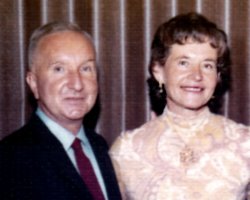Seidman Award Celebrates Timeless Values and Hope for the Future
With a laser-focus on excellence and a deep commitment to his students, Professor Emeritus Jerome M. Seidman, Ph.D. (1911-1986) helped build the Montclair State Psychology Department from nothing to the largest academic program at the University. Each year, the Jerome M. and Cindy Seidman Award recognizes the academic achievement of two exceptional graduating students and encourages them to pursue future accomplishments in their field.
Posted in: Montclair State University Donors

When Professor Emeritus Jerome M. Seidman, Ph.D. (1911-1986) and Cindy Seidman (1914-1991) arrived at Montclair State in 1954 with their two sons, Alan and Robert, in tow, things were different.
“The whole campus was made up of College Hall, Morehead Hall, the Panzer School of Physical Education, Life Hall, Russ and Chapin Halls and a few one-story war surplus buildings, one of which housed the psychology faculty,” recalls Alan. “I used to play on the mountain where Sprague Library now stands.”
“It was like family,” he continues. “Everybody knew everybody. The wives of faculty members got together regularly and started calling themselves the Dames. They even published a recipe book to raise funds for the University. I think my mother typed it!”
Seidman, however, was a visionary who would help usher in a new era for the University. He was one of the founding members of the Montclair State Psychology Department and was instrumental in launching the department’s master’s degree program.
With an unwavering focus on excellence and always with the well-being of his students in mind, Seidman helped build the Psychology Department from nothing to – by far – the largest department on campus.
“We have close to 2,000 students in our department, including majors, master’s and Ph.D. students and those minoring in Psychology,” notes Dr. Yoav Arieh, Chair of the Psychology Department. This is quite an accomplishment when you consider that our department is still relatively new.”
“Dr. Seidman had incredible foresight,” says Dr. Saundra-Collins, who joined the department in the 1980s and worked closely with Seidman until his retirement in 1984. “He was deeply dedicated to the program and to the students. He pushed us all – faculty and students alike – to strive for excellence. But he also recognized the challenges that students faced, especially regarding finances.”
When Seidman created the Jerome M. and Cindy Seidman Award to recognize the two graduating full-time undergraduate Psychology majors who earned the highest cumulative GPAs in their class, he ensured that his commitment to high academic standards and to the students would continue for generations to come.
“The Seidman Award recognizes excellence and encourages future accomplishments,” says Robert. “Dad was very proud of his students. The award was his way of encouraging them to put their knowledge and skills to good use improving the human condition and making life more meaningful and fulfilling for themselves, for others, and for the society as a whole.”
Alan agrees. “This award comes at the end of a student’s undergraduate education. It is intended to encourage the best students to go on for a master’s or doctorate because they have exceptional abilities. That was his goal: to create a beginning.”
Thanks to his sons’ dedication to the ideals held so dear by their father, the dollar amount of the Seidman Award has been significantly increased. Each year, presentation of the award recalls their father’s generous spirit, while reminding all of the higher calling of their chosen field. It has become a very special point in the academic year, and in the lives of the students who receive it.
“I am grateful for, and humbled by, the generosity of the Seidman family,” says recipient Daniel Schwartz ’21. “I am very proud of the work I’ve done. It has been an incredible experience working with such fantastic faculty in the psychology department here at Montclair State, and I am grateful for the opportunity to have done so.”
Nihal Korkmaz ’21 shares her fellow awardee’s sense of honor and gratitude. “It is satisfying to see that your hard work is appreciated by such an amazing faculty.”
Alan and Robert remember their father reading the latest books and journals to stay on top of the latest developments in his field. “He was a prominent author having published four books of readings, plus three second editions: The Child; The Adolescent; Readings in Educational Psychology; Educating for Mental Health.”
Yet for all of Seidman’s excitement about new ideas and groundbreaking research in psychology, it is his expression of timeless values that have become a North Star for his beloved department, and for the entire University community.
At each year’s awards ceremony, a member of the faculty reads from a Commencement introduction Seidman gave in 1981. Although written 40 years ago, his words ring with truth, compassion, and beauty:
A College faculty has four basic interrelated missions: teaching and learning; focus on the arts and aesthetic values of form, harmony and beauty; research for the discovery of truth and the advancement of knowledge; public and community service.
Integrating these missions are human values and behaviors: sensitive, innovative leadership, and creative solutions for the physical and psychosocial health and well-being of people throughout the world; a strong commitment to individual human rights, social and racial justice; encouraging and rewarding cooperation, helping and responsible behavior in the pursuit of excellence.
A college faculty participates actively and critically in the changing needs of society and the peaceful resolution of conflict — and attempts to develop and strengthen moral values, spiritual values, and the capacity for compassion and forgiveness and outgoing love.
Our faculty at Montclair strives to support and improve the human condition, making life more meaningful and fulfilling. We have made a substantial contribution to the lives of our graduating students, and indirectly, our faculty has made substantial contributions to the lives of all of us.
“That speech is so powerful, and so relevant today,” Dr. Saundra-Collins says. “Dr. Seidman planted a seed of hope in our department and made a solid commitment to helping students. His vision endures.”
